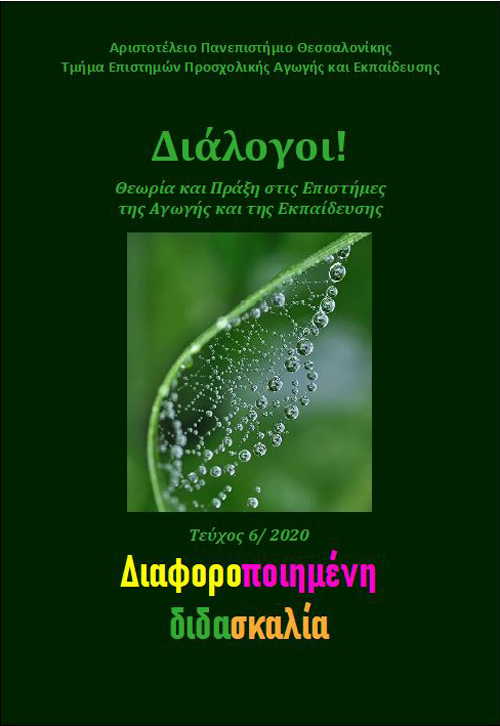Αποκωδικοποιώντας την υλοποίηση της διαφοροποιημένης διδασκαλίας

Περίληψη
Λεπτομέρειες άρθρου
- Πώς να δημιουργήσετε Αναφορές
-
Παντελιάδου Σ., Παπά Μ.-Δ., & Σανδραβέλης Ά. (2020). Αποκωδικοποιώντας την υλοποίηση της διαφοροποιημένης διδασκαλίας. Διάλογοι! Θεωρία και πράξη στις επιστήμες αγωγής και εκπαίδευσης, 6, 30–60. https://doi.org/10.12681/dial.25545
- Τεύχος
- Τόμ. 6 (2020)
- Ενότητα
- Ειδικό Θέμα

Αυτή η εργασία είναι αδειοδοτημένη υπό το CC Αναφορά Δημιουργού – Μη Εμπορική Χρήση – Παρόμοια Διανομή 4.0.
Οι συγγραφείς των άρθρων που δημοσιεύονται στο Διάλογοι! Θεωρία και Πράξη στις Επιστήμες Αγωγής και Εκπαίδευσης διατηρούν τα δικαιώματα πνευματικής ιδιοκτησίας επί των άρθρων τους, δίνοντας στο περιοδικό το δικαίωμα της πρώτης δημοσίευσης. Άρθρα που δημοσιεύονται στο Διάλογοι! Θεωρία και Πράξη στις Επιστήμες της Αγωγής και Εκπαίδευσης διατίθενται με άδεια Creative Commons 4.0 και σύμφωνα με την άδεια μπορούν να χρησιμοποιούνται ελεύθερα, με αναφορά στον/στη συγγραφέα και στην πρώτη δημοσίευση για μη κερδοσκοπικούς σκοπούς και με δικαίωμα τροποποίησης μόνον με παρόμοια διανομή (αν αναμείξετε, τροποποιήσετε, ή δημιουργήσετε πάνω στο υλικό, πρέπει να διανείμετε τις δικές σας συνεισφορές υπό την ίδια άδεια όπως και το πρωτότυπο).
To Τμήμα Επιστημών Προσχολικής Αγωγής και Εκπαίδευσης του Αριστοτέλειου Πανεπιστημίου Θεσσαλονίκης και το Εθνικό Κέντρο Τεκμηρίωσης διατηρούν το δικαίωμα να δημοσιεύουν, να αναπαραγάγουν, να παρουσιάζουν στο κοινό, να διανέμουν και να χρησιμοποιούν άρθρα που δημοσιεύονται στο Διάλογοι! Θεωρία και Πράξη στις Επιστήμες Αγωγής και Εκπαίδευσης σε οποιοδήποτε μέσο και μορφή είτε μεμονωμένα είτε ως μέρη συλλογικών έργων, για όλο το χρόνο διάρκειας προστασίας της πνευματικής ιδιοκτησίας και για όλες τις χώρες του κόσμου.
Αυτό περιλαμβάνει ενδεικτικά, και όχι αποκλειστικά, το δικαίωμα δημοσίευσης των άρθρων σε τεύχη του περιοδικού Διάλογοι! Θεωρία και Πράξη στις Επιστήμες Αγωγής και Εκπαίδευσης, αναπαραγωγής και διανομής μεμονωμένων αντιγράφων των άρθρων, αναπαραγωγής ολόκληρων των άρθρων σε άλλη έκδοση του Τμήματος Επιστημών Προσχολικής Αγωγής και Εκπαίδευσης του Αριστοτέλειου Πανεπιστημίου Θεσσαλονίκης και του Εθνικού Κέντρου Τεκμηρίωσης και αναπαραγωγής και διανομής των άρθρων ή περίληψης αυτών με χρήση πληροφορικού συστήματος αποθετηρίου.


